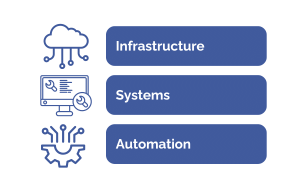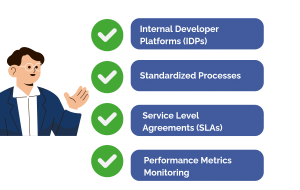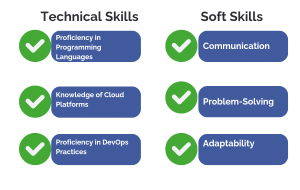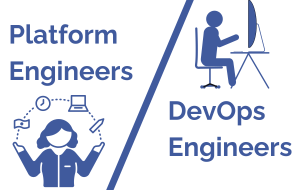 A platform engineer is like the backstage magician of software development, weaving together the invisible threads that make applications run smoothly. They’re the architects behind the scenes, designing and maintaining the infrastructure that supports our favorite apps and services.
A platform engineer is like the backstage magician of software development, weaving together the invisible threads that make applications run smoothly. They’re the architects behind the scenes, designing and maintaining the infrastructure that supports our favorite apps and services.
In today’s fast-paced world of software, where innovation is constant and user expectations are sky-high, the role of a platform engineer is more crucial than ever. They ensure that applications are reliable, scalable, and efficient, handling everything from cloud computing to automation with finesse.
Now, imagine this guide as your backstage pass to the world of platform engineering. We’ll peel back the curtain and reveal the inner workings of this fascinating role, covering everything from infrastructure design to best practices and career opportunities. By the end, you’ll have a deeper understanding of what it takes to be a platform engineer and how their work shapes the digital landscape we interact with every day. So, grab your virtual hard hat and let’s dive in!
What is Platform Engineering ?
Platform engineering encompasses the design, development, and maintenance of the underlying infrastructure and systems that support software applications. It involves creating a robust and scalable platform that enables the seamless deployment, operation, and optimization of applications.
The role of platform engineering is paramount in modern software development as it serves as the foundation upon which applications are built and operated. Platform engineers are responsible for ensuring that the infrastructure and systems are reliable, secure, and efficient, thereby enabling smooth and uninterrupted operation of applications.
Infrastructure, systems, and automation play crucial roles in platform engineering:
1. Infrastructure:
Platform engineers design and manage the infrastructure, including servers, networks, and storage, to support the deployment and operation of applications.
They ensure that the infrastructure is scalable, reliable, and secure to accommodate the needs of growing applications and user bases.
2. Systems:
Platform engineers build and maintain the systems and services that enable the functionality of applications, such as databases, caching systems, and messaging queues.
They optimize these systems for performance, scalability, and reliability to ensure that applications can handle high loads and remain responsive.

3. Automation
Automation is essential in platform engineering for streamlining processes, reducing manual effort, and improving efficiency.
Platform engineers use automation tools and practices to provision infrastructure, deploy applications, manage configurations, and monitor performance.
Automation helps ensure consistency, repeatability, and reliability in platform operations, leading to faster deployment cycles and reduced downtime.
Responsibilities of a Platform Engineer
1. Internal Developer Platforms (IDPs): Platform engineers build and maintain Internal Developer Platforms– a centralized suite of services, tools, and automated workflows. These types of platforms enable developers to self-serve the resources they need for efficient and swift software development and deployment.
2. Standardized Processes: By creating a system that manages, standardizes, and scales typical DevOps workflows, platform engineers provide an easy way to speed up and simplify development processes.

3. Service Level Agreements (SLAs): SLAs define the performance and reliability standards for the IDPs. Platform engineers make sure that these agreements are met, ensuring the security and stability of the platform.
4. Performance Metrics Monitoring:
Platform engineers continuously track performance metrics to optimise the platforms according to the needs of developers.
Skills and Qualifications Required to be a Platform Engineer
Technical Skills:
1. Proficiency in Programming Languages:
Platform engineers should be skilled in programming languages like Python, Java, or JavaScript, as they are often used for scripting, automation, and building infrastructure components.
2. Knowledge of Cloud Platforms:
Familiarity with cloud platforms such as AWS, Azure, or Google Cloud is essential for platform engineers, as they frequently deploy and manage applications in cloud environments.
3. Understanding of Infrastructure as Code (IaC):
Platform engineers should have expertise in IaC tools like Terraform or CloudFormation, enabling them to automate the provisioning and management of infrastructure resources.
4. Proficiency in DevOps Practices:
Platform engineers should be adept at DevOps practices, including continuous integration, continuous delivery, and automated testing, to streamline development and deployment workflows.

Soft Skills:
1. Communication:
Effective communication skills are essential for platform engineers to collaborate with cross-functional teams, convey technical concepts, and address stakeholders’ needs and concerns.
2. Problem-Solving:
Strong problem-solving abilities enable platform engineers to troubleshoot complex issues, identify root causes, and implement effective solutions to improve system performance and reliability.
3. Adaptability:
The ability to adapt to evolving technologies, methodologies, and business requirements is critical for platform engineers to thrive in dynamic and rapidly changing environments.
4. Collaboration:
Platform engineers should possess strong collaborative skills to work effectively with colleagues across different teams, share knowledge, and contribute to collective goals.
Platform Engineers vs DevOps Engineers

Platform engineers focus primarily on designing and managing infrastructure components, DevOps engineers focus on streamlining the software development lifecycle and implementing automation practices to improve collaboration and accelerate delivery. Let’s understand difference between them in a more detail way.
1. Focus:
Platform Engineers: Focus primarily on designing, building, and maintaining the underlying infrastructure and systems that support software applications.
Responsible for ensuring the reliability, scalability, and efficiency of the platform on which applications run.
DevOps Engineers: Focus on streamlining the software development lifecycle and fostering collaboration between development and operations teams.
Responsible for implementing and maintaining CI/CD pipelines, automation practices, and infrastructure as code (IaC) principles.
2. Responsibilities:
Platform Engineers: Design and manage infrastructure components such as servers, networks, and storage. Implement automation and orchestration tools to streamline operations and optimize resource utilization.
Integrate various systems, tools, and technologies to create a cohesive platform environment for application deployment.
DevOps Engineers: Facilitate collaboration between development and operations teams to improve efficiency and accelerate delivery. Implement CI/CD pipelines to automate build, test, and deployment processes.
Manage configuration management tools and implement infrastructure as code practices to automate provisioning and configuration.
3. Expertise:
Platform Engineers: Proficient in infrastructure design, cloud platforms, automation tools, and system integration.
Focus on scalability, reliability, and efficiency of infrastructure components.
DevOps Engineers:Proficient in software development practices, CI/CD pipelines, configuration management, and infrastructure as code.
Focus on accelerating delivery, improving collaboration, and optimizing the software development lifecycle.
4. Collaboration:
Both platform engineers and DevOps engineers often collaborate closely to achieve common goals such as implementing automation, ensuring reliability, and optimizing performance.
While platform engineers focus more on infrastructure and systems, DevOps engineers have a broader scope that includes software development practices and CI/CD pipelines.
5. Career Paths:
Platform Engineers: Career paths may include roles such as Infrastructure Architect, Systems Engineer, or Cloud Engineer.
DevOps Engineers: Career paths may include roles such as DevOps Architect, Release Engineer, or Site Reliability Engineer.
Conclusion
In conclusion, platform engineering is essential for supporting software applications, driving innovation, and enabling organizations to thrive in today’s digital landscape. Readers are encouraged to delve deeper into platform engineering and discover the opportunities it presents for their careers and organizations.



